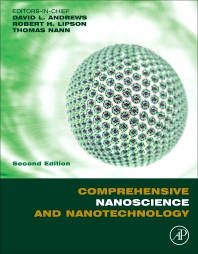LIMITED OFFER
Save 50% on book bundles
Immediately download your ebook while waiting for your print delivery. No promo code is needed.
Comprehensive Nanoscience and Technology, Second Edition, Five Volume Set allows researchers to navigate a very diverse, interdisciplinary and rapidly-changing field with up-to-dat… Read more

LIMITED OFFER
Immediately download your ebook while waiting for your print delivery. No promo code is needed.
Comprehensive Nanoscience and Technology, Second Edition, Five Volume Set allows researchers to navigate a very diverse, interdisciplinary and rapidly-changing field with up-to-date, comprehensive and authoritative coverage of every aspect of modern nanoscience and nanotechnology.
Academic Researchers, lecturers of postgraduates and graduate level students across the broad spectrum of fields involving nanoscience and technology: chemistry, physics, material science, engineering, biology and bio-medical research. Researchers in industry, including policymakers and consultants i.e. nano research laboratories and institutes, professional corporations with activities related to nano and bio-materials and materials science
DA
TN
RL